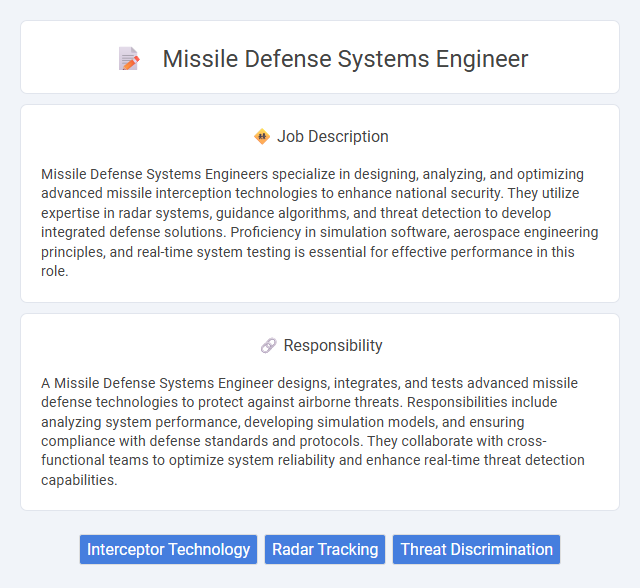
Missile Defense Systems Engineers specialize in designing, analyzing, and optimizing advanced missile interception technologies to enhance national security. They utilize expertise in radar systems, guidance algorithms, and threat detection to develop integrated defense solutions. Proficiency in simulation software, aerospace engineering principles, and real-time system testing is essential for effective performance in this role.
Individuals with strong analytical skills and a keen interest in aerospace technology may be well-suited for a Missile Defense Systems Engineer role. The position likely demands high attention to detail, resilience under pressure, and proficiency in systems integration. People who enjoy problem-solving in dynamic, high-stakes environments probably find this job both challenging and fulfilling.
Qualification
A Missile Defense Systems Engineer requires a strong background in aerospace or electrical engineering, typically supported by a bachelor's or master's degree in related fields. Proficiency in systems integration, radar technologies, and real-time software development is essential for designing and optimizing missile detection and interception capabilities. Experience with simulation tools, threat analysis, and defense protocols significantly enhances effectiveness in ensuring the reliability and accuracy of missile defense systems.
Responsibility
A Missile Defense Systems Engineer designs, integrates, and tests advanced missile defense technologies to protect against airborne threats. Responsibilities include analyzing system performance, developing simulation models, and ensuring compliance with defense standards and protocols. They collaborate with cross-functional teams to optimize system reliability and enhance real-time threat detection capabilities.
Benefit
A Missile Defense Systems Engineer likely benefits from working on cutting-edge technology that enhances national security and defense capabilities. The role probably offers opportunities for continuous learning and professional growth within a specialized field. Competitive salaries and comprehensive benefits packages are often associated with these positions, reflecting the high level of expertise required.
Challenge
Working as a Missile Defense Systems Engineer likely involves complex problem-solving challenges due to the need for integrating advanced technologies and ensuring real-time threat detection and interception. The role probably demands continuous adaptation to emerging threats and evolving defense strategies to maintain system reliability and effectiveness. Engineers in this field presumably face high-pressure situations where precision and innovation are critical to national security outcomes.
Career Advancement
Missile Defense Systems Engineers develop advanced technology to detect, track, and neutralize airborne threats, requiring expertise in radar systems, signal processing, and software integration. Career advancement often involves specialization in emerging defense technologies, project leadership roles, and obtaining security clearances, enabling engineers to lead complex defense programs. Pursuing advanced degrees and professional certifications further enhances opportunities for senior engineering and management positions within defense contractors and government agencies.
Key Terms
Interceptor Technology
Missile Defense Systems Engineers specializing in Interceptor Technology design and develop advanced missile interceptors to detect, track, and neutralize incoming threats. They optimize guidance algorithms, propulsion systems, and sensor integration to enhance interception accuracy and response times. Expertise in radar systems, kinetic kill vehicles, and software simulation tools is critical for improving overall missile defense effectiveness.
Radar Tracking
Missile Defense Systems Engineers specializing in radar tracking design and optimize radar systems that detect, track, and identify incoming threats with high precision. They integrate advanced algorithms and signal processing techniques to enhance target acquisition and improve the accuracy of missile interception. Expertise in electromagnetic wave propagation, radar cross-section analysis, and real-time data fusion is critical for developing effective missile defense solutions.
Threat Discrimination
Missile Defense Systems Engineers specializing in Threat Discrimination develop advanced algorithms and sensor fusion techniques to accurately identify and categorize incoming threats such as ballistic missiles, cruise missiles, and decoys. They integrate radar, infrared, and other sensor data to improve real-time target classification, enhancing system response and interception success rates. Expertise in electronic warfare countermeasures and machine learning models is critical to reducing false alarms and increasing the reliability of missile threat assessments.
 kuljobs.com
kuljobs.com